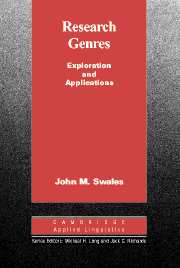Book contents
- Frontmatter
- Contents
- Series editors' preface
- Acknowledgments
- Chapter 1 Toward a world of genre
- Chapter 2 The role of English in the research world
- Chapter 3 Theoretical and methodological issues
- Chapter 4 “Getting done”: The Ph.D. dissertation
- Chapter 5 The Ph.D. defense
- Chapter 6 Research talk and research talks
- Chapter 7 The research article revisited
- Chapter 8 Three remaining issues
- Appendix
- Notes
- References
- Author index
- Subject index
Chapter 6 - Research talk and research talks
Published online by Cambridge University Press: 05 October 2012
- Frontmatter
- Contents
- Series editors' preface
- Acknowledgments
- Chapter 1 Toward a world of genre
- Chapter 2 The role of English in the research world
- Chapter 3 Theoretical and methodological issues
- Chapter 4 “Getting done”: The Ph.D. dissertation
- Chapter 5 The Ph.D. defense
- Chapter 6 Research talk and research talks
- Chapter 7 The research article revisited
- Chapter 8 Three remaining issues
- Appendix
- Notes
- References
- Author index
- Subject index
Summary
In the previous chapter, I reviewed what is known – from a discoursal perspective – of the institutional speech-event known in the United States as the dissertation defense. In this chapter, I consider the current state of knowledge about a miscellany of other spoken (or mostly spoken) research genres. In doing so, I have again relied in part on the existing literature and in part on the MICASE research subcorpus. These genres, some drawn from MICASE and some from other studies, include the following:
a. research group meetings
b. colloquia and invited lectures by leading academics
c. conference presentations
The first of these, often here abbreviated to RGMs, are more or less regular meetings of those involved in the work of a particular laboratory or concerned with a particular subdiscipline in a broader department or who come together to work on a particular research project. Colloquium is one of those genre names, like seminar, that is open to various interpretations, particularly when viewed from different national standpoints (Mauranen, 1994). Here I use colloquium in its contemporary North American sense of a one-time public presentation and subsequent discussion of one or more individual's current work hosted by an academic unit such as a department or institute. Speakers can be internal or external to the host unit. Conference presentations (CPs) are self-explanatory, at least on the surface. Partly because of space constraints, I do not include discussion of advanced graduate courses, often somewhat confusingly known in the United States as “seminars,” but these have been analyzed by Basturkmen (e.g., 2002) and Anderson and Piazza (in press) among others.
- Type
- Chapter
- Information
- Research GenresExplorations and Applications, pp. 173 - 206Publisher: Cambridge University PressPrint publication year: 2004
- 1
- Cited by

